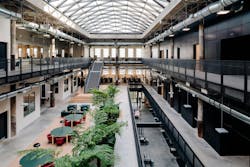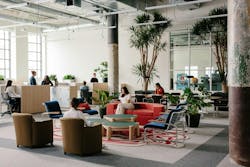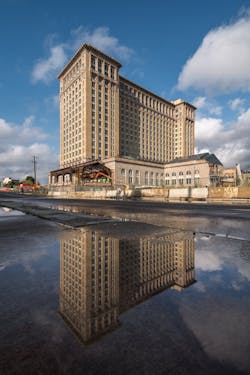Detroit’s Michigan Central Station, centerpiece of innovation hub, opens
By Peter Fabris, Contributing Editor
The recently opened Michigan Central Station in Detroit is the centerpiece of a 30-acre technology and cultural hub that will include development of urban transportation solutions. The six-year adaptive reuse project of the 640,000 sf historic station, created by the same architect as New York’s Grand Central Station, is the latest sign of a reinvigorating Detroit.
The building is the key structure within the 30-acre Michigan Central district, totaling over 1.2 million sf of office, community, and retail space. Michigan Central Station was the main inter-city passenger rail depot in Detroit. Built for the Michigan Central Railroad, it was rushed into service early due to a fire at the city’s existing depot on December 26, 1913, and remained open until 1988. The train depot included a 13-story office tower with a roof height of 230 feet, making it the world’s tallest rail station when constructed. Current owner, Ford Motor Company, acquired the building in 2018.
The project’s engineering and planning services by Buro Happold included daylighting analysis and solutions, building energy performance modeling, and front-end studies using computational fluid dynamics (CFD), to deliver an energy-efficient building.
“The reopening of Michigan Central Station represents a next chapter for Detroit. As initial tenants begin moving into revitalized spaces over the coming months, The Station will become an innovation hub and vibrant destination for all to enjoy, featuring ample retail, restaurants, and hospitality offerings,” says Craig Schwitter, senior partner and chair of the global board of Buro Happold. Buro Happold also provided mobility planning, multimodal streets design, traffic modeling and approvals, e-mobility planning, pedestrian modeling, equity planning, and business case formation. The firm also supported future-of-mobility consulting and planning for “smart city” implementation, such as communication networks and Internet-connected solutions that improve urban living.
Ford and Michigan Central hosted “Michigan Central OPEN,” an 11-day celebration that began June 6 with an outdoor concert featuring iconic Detroit artists. The following 10 days provided the public with a chance to see the revitalized station with an open house before the building’s first commercial occupants begin moving in this fall.
Here is the full press release from Buro Happold:
Following the restoration by Ford Motor Company, the once-abandoned train station will reopen its doors for a first look as the centerpiece of Michigan Central’s 30-acre innovation district.
From June 6-16, “Michigan Central OPEN” welcomes the public to celebrate this major milestone with an opening night concert featuring iconic Detroit performers and a 10-day open house for the public to see the first floor of the revitalized Station.
Registration for free events and tours opens to general public on May 21.
Following a six-year restoration by Ford Motor Company, the iconic Michigan Central Station will begin a new chapter, allowing the public inside for a look at the landmark’s glorious return during a multi-week celebration in June.
Ford acquired the building in 2018 and after extensive restoration and design efforts, Michigan Central Station will become a vibrant destination for Detroiters and all who visit the city, serving as the centerpiece of the Michigan Central technology and cultural hub that spans 30 acres.
To recognize this long-awaited milestone with the community, Ford and Michigan Central will host “Michigan Central OPEN,” an 11-day celebration beginning June 6 with an outdoor concert featuring iconic Detroit artists. The following 10 days will give the public a chance to see the revitalized Station with an open house before the building’s first commercial occupants begin moving in this fall. Visitors will be invited to tour the renovated Station, learn about the rich history of the landmark, the city, and its people, and get a sneak peek into Michigan Central’s bright future.
“I am truly excited to share the historic Michigan Central Station restoration with the entire Detroit community and beyond,” said Bill Ford, executive chair of Ford. “This is a milestone we can all celebrate. Michigan Central Station was once a symbol of Detroit’s decline, and now it is going to represent its renewal and bright future. This monumental project has taken more than 1.7 million hours of work and reflects Ford’s dedication to the community, Detroit’s role in shaping the future of mobility, and the opportunities that our city, state, and region continue to offer.”
On June 6, Michigan Central will kick off the festivities with Michigan Central OPEN Live, a 90-minute outdoor concert in front of The Station headlined by well-known Detroit musical artists. The show will feature short films, appearances by local leaders, and creators telling stories of innovation and culture from around the city and the region.
From June 7-16, Michigan Central will host its OPEN House, offering a first look inside the Station’s historic ground floor through a range of exhibits, entertainment, art, and more. Michigan Central’s art program will also bring art installations, including a new iteration of Reddymade’s me + you, a critically acclaimed interactive sculpture specifically for Michigan Central.
Registration for OPEN Live and OPEN House will begin online at Michigan Central on May 17 for neighbors surrounding The Station, and on May 21 for the general public.
After its reopening event in June, The Station will begin a phased reactivation of the building over the next several months and years as restaurant, retail, and other commercial and community-focused partners take up residency. The first floor will be open to the public for tours on Fridays and Saturdays through August. Expanded hours will be announced for fall, when the first phase of commercial activations opens to the public. More information on the Michigan Central OPEN festivities, including how to register for tickets, can be found at Michigan Central .
A bygone transit depot transformed into a global mobility innovation
First opened in 1913, Michigan Central Station was considered to be one of the grandest train depots in the United States and served more than 4,000 passengers a day at its peak. However, as preferences and technology changed in regards to travel, The Station was closed in 1988 and remained vacant until Ford’s acquisition of the property in 2018, with a vision by Bill Ford to propel Detroit forward with a one-of-kind mobility innovation hub, Michigan Central.
During the past six years, more than 3,100 skilled-trade workers have dedicated over 1.7 million combined hours to meticulously restore it to its original Beaux-Arts glory and create a new institution to welcome future generations starting this June.
The Station’s opening is the next step for Michigan Central’s innovation ecosystem dedicated to pioneering the future of mobility, fueling economic development, and re-establishing Detroit as a leader in innovation. When complete, The Station will include 640,000 square feet of retail, hospitality, community, and office spaces supporting the Michigan Central ecosystem by accommodating larger tenants and established companies, attracting more technology talent, drawing in diverse businesses, and providing a range of collaboration-oriented amenities. Michigan Central will also be a destination on Detroit’s greenway plan, uniting dozens of local neighborhoods across the city to create a more connected Detroit.
“At Michigan Central, we’re harnessing Detroit’s long-standing leadership in mobility and economic innovation to create a thriving, global destination for accelerating bold ideas and new solutions that shape our shared future,” said Joshua Sirefman, CEO of Michigan Central. “At the heart of this is The Station, an iconic building that now serves not just as a reminder of our city’s history, but a powerful catalyst for growth and opportunity.”
In April 2023, the long-vacant former Book Depository building reopened as the home of Newlab at Michigan Central, which serves as the epicenter of the startup and early-stage companies within the Michigan Central ecosystem. Now home to almost 600 employees from more than 90 companies and startups, Newlab at Michigan Central has rapidly grown into a diverse community of entrepreneurs, inventors, designers, and others from all over the world committed to developing new mobility technologies in and for real-world settings. Roughly 40 percent of startups at Newlab originated outside of Michigan, and over half of the startups have at least one founder who is a woman, a person of color, or comes from an otherwise underrepresented background.
Michigan Central has also made it a priority to support residents, businesses, and community-focused organizations with direct investments and high-quality, credentialed education and training programs. Through skills-training programs, Michigan Central seeks to address early barriers in Detroit’s talent pipeline, promote equitable outcomes, and offer accessible pathways for upskilling into well-paying careers of the future.
The opening of the reimagined Station marks the next chapter for the historic building itself, as well as Michigan Central as its ecosystem continues to gain momentum as Detroit’s newest anchor institution and a global destination.



